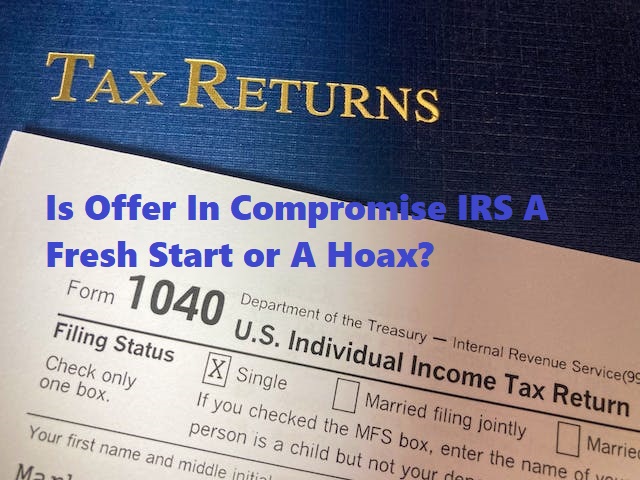Many people consider the Offer In Compromise (OIC) IRS a fresh start. When you are mounting yourself under the burden of tax debt, you don’t realize how stressful it can become. Well, everybody deserves a second chance, don’t you think? The IRS has a scheme in place that allows tax debt holders to have a fresh start. And today we will discuss how you can successfully apply and benefit from it.
Imagine owing the Internal Revenue Service (IRS) a significant amount of money that you cannot pay; stressful right? Well, the IRS imposes hefty fines and sanctions on individuals who fail to pay back their tax debt. However, there are a few relaxations on offer as well; that is if you meet the criteria.
Eligibility Criteria for Offer in Compromise IRS
A program called Offer In Compromise (OIC) is a potential lifeline for taxpayers who owe the IRS a lot of money and have no way to pay them. Offer in compromise IRS allows taxpayers to repay their tax liabilities for less than the money they owed to the IRS. As comfortable as it sounds, there is a catch to it! The IRS has set eligibility criteria and you need to fulfill the following requirements to benefit from the program.
- Ensured all necessary tax returns have been filed and obligatory estimated tax deposit payments have been made.
- Not currently involved in an ongoing bankruptcy proceeding.
- Possess a valid extension if seeking relief for the current tax year.
- As an employer, fulfilled the requirement of making tax deposits for the current quarter and the preceding two quarters.
To further help taxpayers, the IRS has an Offer in Compromise IRS Pre-qualifier Tool available on the official website. You can enter your financial information and tax filing status to calculate an expected offer amount.
Prepare your Offer in Compromise IRS application
You must file your Offer in Compromise and wait for the decision. The IRS takes a lot of factors into consideration before accepting or rejecting your application such as your ability to pay the debt, net income from all sources, expenses, and asset equity. Not to mention, filling out your application honestly and without errors increases your chances. If you are applying for the offer in a compromise IRS program, it is high time to partner with Lifeback Tax Relief to avoid making any mistakes that can lead to refusal. Our experts are here to assist you along the way and make your case as strong as it can be.
Currently Not Collectible Status
Another lifesaver, especially for small businesses is the currently not collectible status (CNC). Although this program allows some breathing space to taxpayers and an adequate amount of time to repay their debt, the debt itself does not go away, it increases in fact!
Your debt still grows
Put in simpler words, CNC is a temporary relief from IRS collection actions. Normally, individuals who are granted the currently not collectible IRS status are exempted from repaying any tax debt for a specific period as agreed upon. But it should not be mistaken for debt being waived off. Unlike the offer in compromise, when someone is placed on CNC status their debt continues to increase because penalties and interest are still being charged until the full amount is paid to the IRS. This means that the IRS will once again show up at your doorstep once the allotted time has passed. So prepare yourself beforehand!
Either way, seeking professional assistance especially when proving financial hardships to the IRS is essential. Lifeback Tax Relief can add valuable insights to your application, and almost guarantee acceptance.
Differences between Offer in Compromise IRS and Currently not Collectible
Both programs are suitable for taxpayers under different circumstances. If you believe that based on your circumstances you are unable to pay the tax debt due to income, assets, and other financial factors, the OIC might be the way to go. On the other hand, if you are facing financial strains in daily life, the IRS CNC program is the best choice, especially if your debt is going to drop due to the Collection Statute of Limitation (CSED).
More important is to determine which program suits you best and for that, you should consider technical and complex debt resolution factors as well. Lifeback Tax Relief can perform a thorough evaluation of your current assets, income, expenses, and asset equity to formulate the best course of action for you.
Here we have compiled some of the key differences between OIC and CNC programs:
| Feature | Offer in Compromise IRS | IRS Currently Not Collectible |
| Objective | To settle tax debt for less than the full amount owed. | To temporarily suspend collection activities due to financial hardship |
| Qualification Criteria | Inability to pay the full tax debt due to income, expenses and assets. | Inability to meet basic living expenses while paying tax liabilities. |
| Outcome | Settles the tax debt for an agreed-upon reduced amount. | Temporarily suspends collection without reducing the overall tax debt. |
| Duration of Status | Temporarily suspends collection without reducing the overall tax debt. Once accepted, all the debt is settled and federal tax liens are released. | Temporary relief until the taxpayer’s financial situation improves. |
It’s important to note that both Offer In Compromise IRS and Currently Not Collectible status are viable options for individuals facing financial challenges, and the choice between them depends on the specific circumstances of the taxpayer. Consulting with our tax professional can provide valuable guidance in determining the most suitable path for you.







